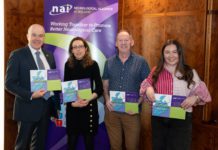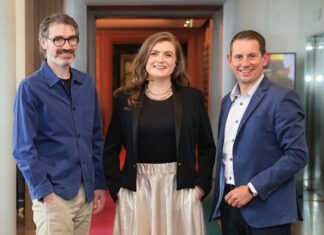University of Galway researchers have developed a modular approach to vaccine synthesis, potentially enabling production of a new cancer vaccine prototype.
The study, published in the Journal of the American Chemical Society, is a collaboration involving a number of laboratories in Ireland, Germany, Sweden, the Netherlands, Spain and the US.
The research paper, available here, describes a novel approach and has implications for vaccine design.
The vaccine contains three different components which can be assembled like lego blocks.
The first is a targeting component, a glycocluster, to selectively deliver and increase uptake of the vaccine into the relevant cells of the immune system. The second component is a T-helper epitope in order to to generate long-term immunity.
The third component is a cancer T-antigen containing molecule (MUC-1), in order to stimulate the immune system to generate immunity against cancer associated antigens found on breast tumour cell surfaces.
The incorporation of the glycocluster has led to a much-improved immune response to the vaccine. The glycocluster molecule is comprised of multiple sugars and has a high stickiness or affinity for a receptor (macrophage galactose C-type lectin) on certain immune cells (dendritic cells).
The vaccine is about 10 times stickier when it has the glycocluster than when it is absent, which explains its greater uptake into the immune cells and increased efficacy observed for the vaccine prototype.
The modular or lego-block approach means that other types of glycoclusters targeting other immune cell lectins or T-helper epitopes or tumour antigens could be built and studied in a systematic manner and thus contributes to the field of vaccine design.
The study was primarily carried out by Dr Adele Gabba while she was a PhD student at University of Galway, under the supervision of Professor Paul Murphy, and subsequently as a postdoctoral fellow in the laboratory of Professor Pol Besenius at the Johannes Gutenburg University of Mainz, Germany.
During the PhD study, Adele obtained an EMBO travel award which enable travel to the laboratory of Professor Ulrika Westerlind at Umea University in Sweden where vaccine constructs used in the study were prepared.
Professor Paul Murphy, Established Professor of Chemistry at University of Galway and SFI Investigator said: “I am hugely in debt to all the collaborators for all their contributions, and especially grateful to Dr Adele Gabba, for the persistence she showed throughout, which was the key to the success of this research, spanning her PhD study and a subsequent period as a postdoctoral researcher in Mainz.
“Glycoclusters, after many years of study, are beginning to show applications that benefit health and industry.
“It may even be possible to use the modular approach incorporating glycoclusters to design vaccines for infectious diseases caused by bacteria or viruses or for the targeted delivery of biopharmaceuticals or small molecule drugs to where they are needed.
“Importantly, no adverse effects were observed of the prototype during the study, while the efficacy was improved.”
The research was supported by the Irish Research Council, European Molecular Biology Organisation, Science Foundation Ireland, the European Union’s Horizon 2020 research and innovation programme, the Kempe Foundation, as well as the various institutions supporting the researchers who contributed to the paper.













